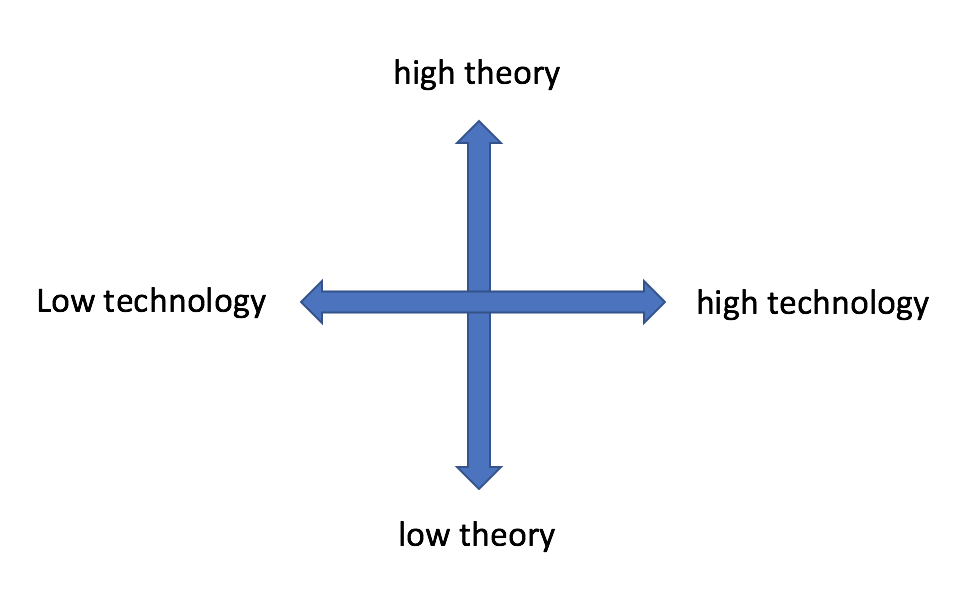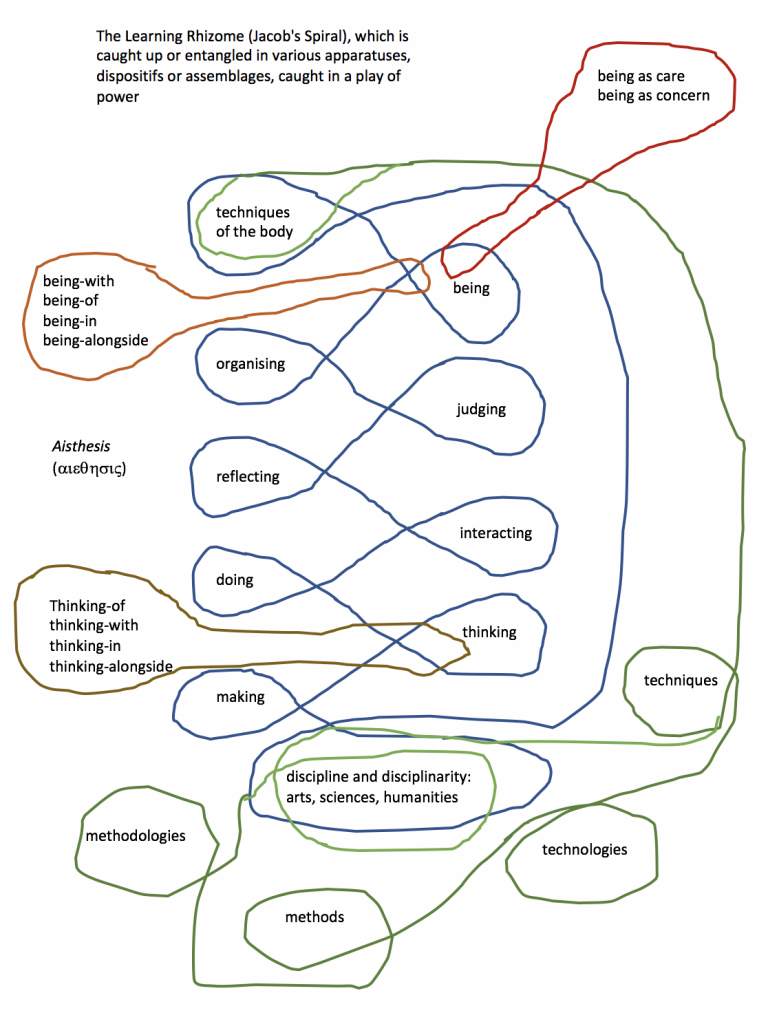Workshop Report:There’s more to appearances …The first Out!Learn workshop/learning event [1] took place in Harrow on 27 February. It raised some of the pedagogic themes of the community, and tried an experimental approach of combining low-technology (i.e. paper and string, although we didn’t get round to the string) with high-theory, as a means of examining the interfaces, inter alia, between theory and practice, making and doing, acting and reflecting, thinking and judging, as well as subject and object and body and mind, with reference to techniques of the body [2] such as yoga and its relationship to Vedanta [3]. There are opportunities to develop workshops in all of the quadrants of the technology-theory inter-relationship.
Given this starting point, the agenda for the next Oui!Learn meeting is how to develop a series of workshops that articulate a kind of rhizome or ‘Jacob’s Spiral’ of learning, starting from the making (techne) – thinking (episteme) interface, along the following lines:
The workshops would embody exercises in the articulation of technology, very broadly conceived (note especially, that ‘the book’, ‘journal article, ‘newspaper article, ‘videorecording’, ‘web site/page’, and so on, are all considered ‘technologies’) and theory and/or thinking, including thinking-through-materials (opening up a discussion about the differences between materials-based research and learning and practice-based research and learning). A number of other themes also arose during the course of the first workshop/learning event, for example, whether the relationship between Oui!Learn and the University is best characterised as one between a community of learning and a community of power [5]; or alternatively, is a relationship of disruption (‘innovation’) or one of parasitism. The notion of the the parasite is being taken in many senses here, but in addition to the scientific and philosophical discussion of parasitism [6], the emphasis (switching, no doubt illegitimately, from Greek sitos to Latin situs), is upon ‘site’ as situation, place and environment, so that Oui!Learn constitutes a para-site, a site or situation of learning, or a learning environment, that exists alongside or in an oblique relation to more conventionally understood learning environments, such as ‘the classroom’, ‘the laboratory’ and ‘the library’. Notes [1] Here, one might look at the notion of ‘event’ as it occurs in such writers as Deleuze, Badiou and Lyotard, in order to conceive what might be meant by the notion of a ‘learning event’, which would not take the form of an ‘efficient’ lesson. Badiou, A. (2006). Being and event. London, UK: Continuum. Badiou, A. (2007). The Event in Deleuze. Parrhesia,(2), 37-44. Available from http://www.parrhesiajournal.org/parrhesia02/parrhesia02_badiou02.pdf [Accessed 10 October 2015]. Deleuze, G. (1990). The Logic of sense. London, UK: Athlone Press. Lyotard, J.-F. (1988). The Differend: phrases in dispute. Manchester, UK: Manchester University Press, pp.164-165. [2] Mauss, M. (1992). Techniques of the body. In: Crary, J., and Kwinter, S., eds. Incorporations. New York, NY: Zone, 455-477. [3] Discover Vedanta (2018). What is the relationship between yoga and Vedanta? Vedanta: Yoga of Objectivity. Available from http://www.discovervedanta.com/relationship-bw-yoga-vedanta.htm [Accessed 1 March 2018]. [4] Alexander, V.N. (2002). Narrative telos: the ordering tendencies of chance [Research paper]. City University of New York. Available from http://72.52.202.216/~fenderse/Narrative_Telos.htm [Accessed 4 October 2015]. [5] Moxley, J. (2008). Datagogies, writing spaces, and the age of peer production. Computers and Composition, 25 (2), 182-202. Available from http://linkinghub.elsevier.com/retrieve/pii/S8755461508000200 [Accessed 21 February 2018]. Blake, Elizabeth S. (1995). Talking about research: Are we playing someone else’s game? In J. M. Moxley & L. T. Lenker (Eds.), The Politics and Processes of Scholarship. Westport, CT: Greenwood Press. Moxley makes it clear that technologies and pedagogies are not ideologically neutral. The people who shape pedagogies and what Moxley calls datagogies have specific goals and assumptions about teaching and learning that shape the interface. In order to consider how ideologies can inform learning design, Moxley turns to Elizabeth S. Blake’s depiction of two contrasting value systems/communities in academe. As Moxley summarises Blake, members of the Community of Power seek to secure power, are driven by self-interest, winning, and academic prestige, and are concerned with claiming academic territory and copyright. Members of the Community of Learning seek to engage learners, value the pursuit of truth and understanding, are more committed to free culture than copyright, and see all learning as an interconnected, collaborative act. For Blake (1995: 31), as cited by Moxley (2008: 186), the values that inform the Community of Power have become “so overwhelmingly dominant in our lives that they threaten to engulf the values of the Community of Learning. Education at all levels finds itself awash in competition-competition for power, resources, and recognition-and drowning in the competitive imagery of larger society. The danger is that educational values will be lost”. Moxley adds a word of caution: these categories cannot be treated as exclusive, binary alternatives. They are admixed or entangled in any given organisation of higher education. However, if the situation was as Blake described it in 1995, how do things stand in that respect in 2018? [6] References here are of two sorts, scientific and philosophical discussions of the notion of the parasite. For the scientific discussion, Victoria has helpfully provided the following podcast link: Parasitism. For the philosophical discussion, see Derrida, J. (2000). Of hospitality. Stanford, CA: Stanford University Press. Serres, M. (1982). The Parasite. Baltimore, MD: Johns Hopkins University Press. |
Workshop Report: There’s more to appearances …
parsonal
2018-07-01T09:50:24+01:00

